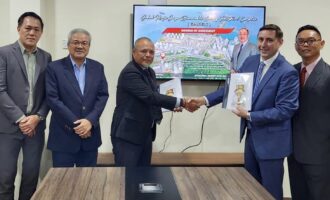
Consortium to develop methanol-to-SAF process technology
A consortium, composed of BASF, Thyssenkrupp, OMV, DLR and ASG, will develop a novel process technology to produce sustainable aviation fuel (SAF) from sustainably produced methanol from CO2 and green hydrogen.
The production process should generate only minimal additional CO2 emissions and be easy to integrate into existing production plants. The five companies, which represent the entire value chain, will facilitate the selective production of SAF that can be used as a drop-in fuel up to 100%.
Germany’s Federal Ministry for Digital and Transport (BMDV) announced funding for the Methanol-to-SAF (M2SAF) development project in the amount of EUR3.1 million (USD3.2 million).
The official certificate of funding for the M2SAF project was presented to the representatives of the M2SAF consortium by State Secretary Oliver Luksic from the Federal Ministry of Digital and Transport on November 16, 2022, in Frankfurt, Germany.
The two and a half year development project started in August 2022 with the first activities. A development platform for PtL fuels, which will demonstrate production on a semi-industrial scale and support the market ramp-up of PtL fuels, is being coordinated by NOW GmbH and beingimplemented by the project lead VDI/VDE Innovation + Technik GmbH.
“We are pleased to see the bundled know-how and the initiative of the renowned industrial companies in the M2SAF consortium, companies who want to jointly drive innovation and technologies in order to effectively support the decarbonisation of air transport and thereby the climate goals of our federal government,” said Luksic. “The fact that the development project plans to use existing industrial facilities promises a quick realisation of the M2SAF project along with scalability of production to industrial levels. These are crucial factors in providing the best support in our transformation to net zero carbon.”
In addition to catalyst development, process development, plant integration and the design of a demonstration plant, the project also includes technological-economic and environmental analysis as well as related support for the certification and analysis of the new jet fuels.
SAF are a sustainable alternative to conventional kerosene and can be used as drop-in fuel without any modifications to the engines or infrastructure. Numerous technologies based on the use of sustainable biomass or on renewable energies are currently under development. European aviation fuel legislation also mandates the use of SAF (of biological and non-biological origin) by 2030. One thing all current SAF types have in common is that they are used in a blend with conventional kerosene. However, depending on the production route, the blend is usually limited.
“OMV aims to become a leading supplier of sustainable fuels, chemicals and materials. The development of new production routes for sustainable aviation fuel from CO2 and green hydrogen are crucial for a successful transformation. That’s why we are excited to be part of the M2SAF consortium and look forward to rapidly advancing the development and production of SAF based on green methanol, scaling it up, and making it available to the market,” said Martijn van Koten, OMV Executive Officer, Refining.
“As part of the consortium, we are pleased to be able to support an important step towards climate-neutral mobility. As a globally active plant engineer and builder, we can use this stimulus project as an effective and synergic way to expand our sustainability strategy around our green technologies for the production of hydrogen, ammonia and methanol. Based on our expertise and current R&D activities, we would also like to make an important contribution to the successful energy transformation in the downstream area with new processes for the sustainable production of chemicals and fuels,” said Cord Landsmann, CEO, thyssenkrupp Uhde.
“We are proud to be able to advance sustainable solutions together with our partners in the M2SAF project,” said Detlef Ruff, senior vice president, BASF Process Catalysts. “To address climate change, we will develop alternatives to fossil fuels. Catalysts will play a central role on the path to net zero as they will in this project as well. The M2SAF project thereby offers an excellent opportunity to play our part and contribute our knowledge. Based on our many years of experience in the development and production of catalysts, we want to help shape the project successfully.”
echo '








